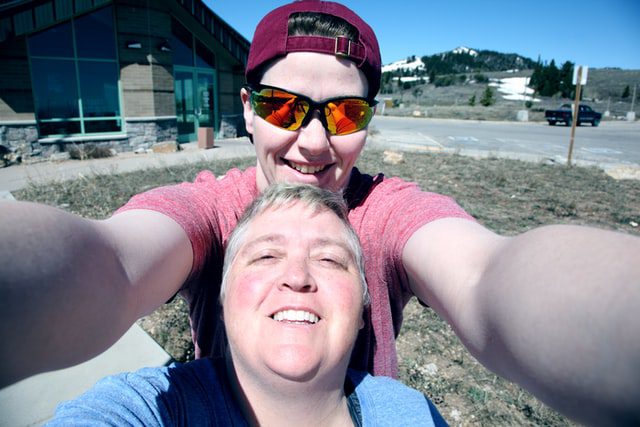
Being a Transgender Parent
We want to start by saying that, in the end, a transgender parent is essentially no different from a cisgender parent. Many have a biological relationship to their children. If not, the child was either legally adopted, or the person assumed care of the child because of biological relation to a partner or something along those lines. No matter what the logistics of the relationship might be, what is most important is the child’s happiness and the stability of the home environment. This part is essentially no different for transgender parents than for the general population. Of course, it is also not related to the sexual orientation of parents.
Honesty is an essential cornerstone for all parent/child relationships. Research has shown that when something quite as important as this is hidden from a child, they are likely to develop anxiety because they pick up on something going on but cannot always identify what it might be. If a child is kept in the loop and assured that things will be okay and that nothing is wrong, then it serves as a protective factor for the child’s mental health.
If parent/child relationships are loving and close, then it is most likely that a child will not be particularly bothered by physical changes to the parent, as long as the love between the parent and the child remains steady, the well-being of the child will be protected. Children tend to become stressed and struggle with self-esteem if they feel that they have done something wrong, if they think that their family life is at risk, or if they get the feeling that something is terribly wrong and they cannot pinpoint what it is. So, uncertainty causes more significant concerns in children’s lives than dealing with change when kept in the loop.
There is only limited empirical research available on the experience of transgender parents and their children, and reproductive options for transgender people are ever-expanding. There is an obvious need for data collection and research in this area.
One of the main concerns in current research is the stigma and discrimination that children of transgender parents experience from external parties, like teachers or peers. When a child experienced a parent’s transition, some risk factors were identified. Foremost was the preexisting relationship between parents and their children. Negative influences from the other parent can also cause problems for the child. Social stigma and discrimination is the biggest risk factor.
Gender Identity and Parent/Child Relationships
Research has indicated that children’s happiness tends not to be related to a parent’s gender identity or sexual orientation at all. Most often, if that is a source of distress, it is due to external discrimination where children tease children from cisgender families about their transgender parents. This, however, suggests a failure on the part of society and not on the part of transgender parents.
Stress is also likely to come from when there are custody problems between the parents or other manners of unhappiness within the family. Children should feel comfortable enough to come to adults in their family for further information on important things in their lives, even if those things are uncomfortable, like having a child ask about sex. Regardless, it is also still important to maintain boundaries. Existing research on human development shows that boundaries are crucial within families, and children who are afforded too much freedom end up experiencing similar stress levels to those who live in environments that are too strict. This is even more important when the family formation changes due to the transgender identity of one of the parents.
One way to help children is to make sure that they understand what terminology means. Discuss words with them, for example, non-binary, trans men, trans women, sex assigned at birth, transgender, gender nonconforming, etc.
When Children Experience Discrimination for having Transgender Parents
Something that transgender parents might benefit from researching is the Minority Stress Theory which relates to how the stresses of belonging to a minority group can affect the mental health of children and adults alike. Understanding the Minority Stress Theory can also help parents boost their children’s resilience to distress from this. It is an unfortunate reality for many children in the world and is certainly not unique to families where the parents have an alternative gender identity or sexual orientation.
What becomes essential in transgender parenting is to fight for your children if they end up experiencing discrimination because they have transgender parents. The same would be true for any other kind of discrimination as well. Children will likely develop higher self-esteem if their parents fight for them and defend them in difficult times.
The parents, in turn, must make sure that they themselves have enough support.

A Child’s Perspective on a Parent’s Transition
Overall, children tend to be happiest when their parents are happy, and their family environment is good. If a parent is stopped from transitioning, they are likely to struggle with mental health issues because of the angst that gender dysphoria causes. Therefore, if a parent transitions successfully and thus becomes more at peace with themselves, the children will be happier because the parent is happy.
It is also likely that having a parent who goes through transition and comes out happier and more fulfilled on the other side will improve children’s sense of self-worth because self-acceptance and family support are already established as important cornerstones to happiness. Such children will also feel safer in exploring their own gender identity, and they are more likely to become allies for transgender children with who they may come into contact. Something interesting to note here is that it is unlikely for the children of transgender parents to also be transgender themselves. It is uncommon, even in the world of psychology, as this sort of thing often carries a genetic component. But in the case of transgender people, the genetic component is not nearly as prominent as it is in other communities.
It is generally accepted that younger children adapt better, with school-age children and adolescents having more difficulty. There is little evidence on the direct impact of adult children as the relationships between a parent and adult child are often quite complex, and the effect of a single factor cannot always be tracked. That being said, the child’s age is less important than the perceived support and love that the child receives during the process. If there is love and harmony within the family and the household, then the child is more likely to cope better in any case than if there is turmoil.
A major new study suggests that as long as the relationships between parents and their children are good, then the parent’s gender identity does not adequately affect the psychological well-being of the child. It also reiterates the importance of gender expression in the parents as a denial of gender expression increases depression and stress rates among parents, which can cause psychological problems in children.
In some cases, the parent might have already undergone gender transition by the time the child is of school age. This will be different for children who are a bit older when their parents undergo sex reassignment treatments. It is important that children know what to expect (within reason) and that the treatment is ultimately meant to help. It is not necessarily necessary to discuss surgeries in too much detail with children unless they are older children who have questions, and the parent/child relationships are in line with the sharing of such information.
Dealing with Opinions of Other Family Members
It is likely that not all family members will be on board with the idea of a transgender parent, and this could potentially complicate things when children are involved. Family turmoil can be highly stressful for children, especially when there are custody disputes and divorce proceedings/visitation arrangements involved. Whenever the family formation changes and there is stress involved, the children are sure to pick up on it.
If possible, it is vital to prioritize and protect parent/child relationships between both parents, not just the transgender parents. It is also strongly suggested that if it is possible, the other parent be included in the coming out plan of transgender parents. Having a sense of unity regarding the gender transition will definitely protect parent/child relationships for both the transgender parents and the cisgender parents involved.
If necessary, give these other people in your family information and research on topics related to trans people, transgender parents, transgender equality, etc. Perhaps their opinions are informed by a lack of understanding. If not, the research will not make a difference, but you would have done what you could to improve the situation.
Transgender parenting sometimes involves cutting ties with people who are bad for you and your children’s wellbeing. The only time when this might not be possible is if the trouble is coming for the children’s other parents. Then you would need to check custody information, and this can end up creating even more problems than it might solve. It would be a very personal decision to challenge custody.
Protection of Parental Rights
Unfortunately, transgender rights are still not where we would ideally want them to be, so it is important that you make sure that your rights as a transgender parent are protected. Find out what the law says within your jurisdiction. Remember to also consider any possible challenge to the validity of your marriage.
If you are looking to adopt, it is best to play your cards open with adoption agencies; the last thing that you would want is for your child’s adoption to be bought into question later down the line. It might also be necessary to speak to school officials. If these officials are supportive and understanding, then you are lucky, and they will appreciate being kept in the loop so that they can actively help to ensure your child’s well-being. However, if there are discrimination cases from these officials, you will need to get in front of that. You have legal rights that trump their responsibility, and they cannot discriminate against your child because you are transgender.
Also, make sure that your will and testament are in order before undergoing transition surgeries. As horrible as it sounds, any surgery inevitably carries the risk of complications, no matter how small or how important that surgery might be, so it is best to be prepared for the worst. Hopefully, it will never come to pass this way.
Keep yourself informed on information released by the entities such as the American Psychiatric Association, outcomes of custody disputes, and other laws related to transgender equality and adoption-related custody cases. Knowledge is still power, and being able to identify when someone is behaving outside of the law can save you a lot of anguish.

Forming Partnerships with Other Families in Your Neighborhood
Having a support system is essential during a transition process, and the same would be true for your child. If your community is quite close and children who go to school together also live relatively close together, then it might be beneficial to speak to families in the neighborhood that have children about the same age as yours. Creating a support structure for yourself and your family by forming allied relationships with families in your neighborhood can be great. Especially in cases where family relationships are not as strong as they could be, support from neighbors and friends can be beneficial to children of transgender parents.
Depending on where you find yourself, there might be people with transgender children who would want to come to your for advice, and you could end up helping transgender youth while trying to get support for your children. Anything is possible.
Frequently Asked Questions
Will my gender identity impact the gender identity of my children?
Most likely not. Your children might be more aware of how they identify with their gender, but the child’s gender identity is not directly linked to the gender identity of the parent. Most transgender people who have biological children report that their children do not identify as transgender.
What do I do as a transgender parent if one of my children is bullying a transgender child in school?
Bullying is a sign of esteem and other emotional problems. It would be best to make sure that you take them to therapy and set strict boundaries about how emotions can be expressed. But remember not to discredit their feelings. They are entitled to feel the way they do, but they are not entitled to take out their pain on others. The fact that they are targeting transgender people might be pertinent and could be a sign that it is bothering them more than they might let on. In this case, you can use it as a way to breach the subject.
Will adoption agencies help me if I am transgender or gender nonconforming and want to adopt?
Yes, many agencies are less bothered by your gender identity and more bothered about the love and stability you and your partner could offer children. A good place to start is to research what the law in your area says about the matter. Make sure to include general parental rights related to adoption in your search as well, along with custody information. The overall view on transgender people and non-nuclear family constructs is becoming more positive. Same-sex couples can adopt freely in most places, which is becoming true for transgender people. It is only in overly conservative areas where adoptions can be complicated for transgender people. It would therefore depend mainly on where you are trying to adopt from.
Are there countries that will not offer adoption privileges to transgender and gender non-binary people?
Yes, some countries are very conservative, and if you are looking at overseas adoption, you will need to do your research carefully. There are countless resources available online, and you should be able to consult with a lawyer on your options as well. Remember also that adoption is not your only option. The fact that you are transgender will only be a problem if you are trying to adopt from a very conservative place.



